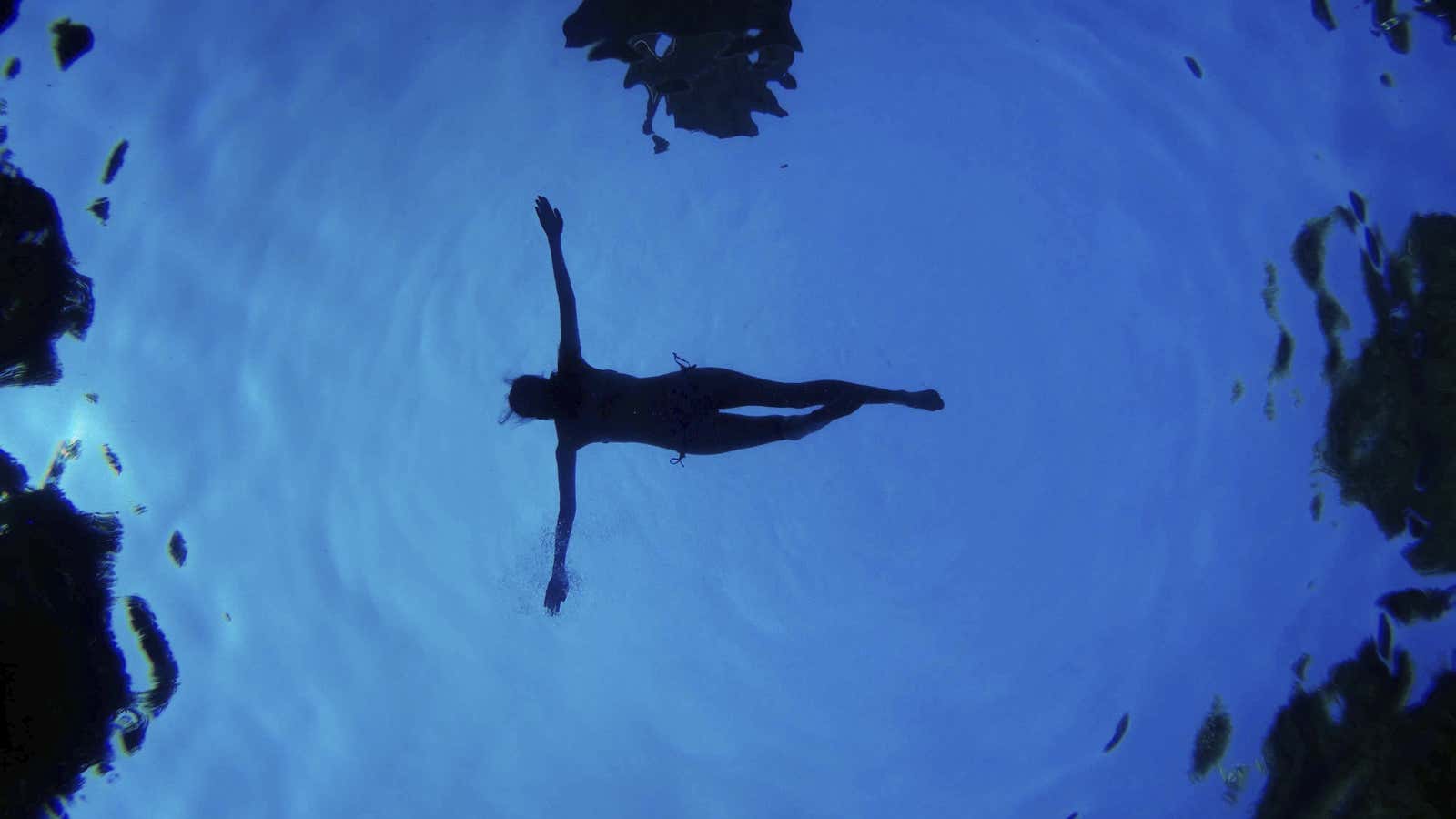The dress code was business attire, but I am wearing a wetsuit.
At the Milken Institute’s 2019 global conference, the world’s luminaries—investors, financiers, government leaders, and the occasional entertainment star—have come together to talk about how capitalism can make everyone richer and, in turn, everything better. At least, that is what seems to be happening around the edges of the Beverly Hills Hilton pool, where well-dressed conference goers are clinking glasses and rehashing the day’s sessions and successes.
But inside the pool, the day’s panel discussions are forgotten. Here, a few dozen men and roughly half a dozen women have discarded their color-coded conference lanyards and are standing in ill-fitting wetsuits in the only somewhat heated water.
Half of us have our eyes shut, awaiting instruction; the other half is saying, together, again and again as a mantra: “Breathe in. Pause, pause. Breathe out. Two, three, four, five, six, seven, eight.” The people standing around the pool look ever so slightly unnerved. Meanwhile, two men with underwater GoPros circle us like sharks.
Eventually, half of us will hold our breath underwater for up to 2 minutes and 30 seconds, bobbing about the pool like pieces of driftwood. As we float, our partners place their hands on our biceps to hold us steady, and mutter encouraging words of support: “You’re doing great. Just relaxed. Very relaxed. Super great.”

As the conference agenda describes it, this session, called “How Resilient Are You? A Human Performance Workshop,” is a “master class in resilience and mental strength,” hosted by human performance expert Andy Walshe and former Navy SEAL Jurgen Heitmann. The exercise, Walshe tells me, is an opportunity to “give people the chance to challenge themselves in an uncommon way, and through that challenge learn a little bit about themselves.” It is the only Milken Institute conference session held in a body of water.
The science of being underwater
For the first two or three minutes of holding your breath, nothing very much happens to your body. The little voice inside your brain may be panicking—the fear of drowning, or suffocating, is extremely primal—but your lungs are mostly okay. Gradually, however, as the oxygen levels in your blood begin to dip, and your lungs constrict, your carbon dioxide levels will creep up. Your body pulls oxygen out of the blood, triggering a rise in blood pressure. Soon after that, your brain’s respiratory centers will tell your body in increasingly desperate terms that now, now, now! it’s really time you started breathing again. Your lungs will begin to burn; next, your diaphragm will spasm until you have no choice but to start breathing again.
This reflex is almost impossible to suppress. But if for some reason you don’t take a deep breath in, you’ll probably pass out, with normal breathing procedures resuming very quickly. If you’re somehow prevented from doing that, things start going horribly wrong. When the brain doesn’t get enough oxygen, its cells begin to die off, eventually becoming permanently damaged. A few minutes after that, you will be brain-dead, and then just the regular kind of dead. If you’re underwater, your lungs will fill with water and you will drown. (This is not our aim. None of this nastiness should happen in the first two or three minutes.)
There’s another curious aspect to holding your breath underwater.
When your face meets cold water, whether via a damp washcloth, purposeful sink-splashing, or—the ideal—utter submersion, your body’s mammalian diving response is triggered. This reflex is much more useful, and extreme, for mammals who spend most of their time diving, like whales or dolphins, and in fact seems to be an evolutionary holdover from our underwater ancestors. (Writer Sarah Gailey colorfully describes this as “whale cosplay.”)
The diving response is triggered when your nostrils and face get wet, particularly when you’re holding your breath. This has a profound effect on your cardiovascular system. Initially, you’ll experience a sense of calm, with your heart rate dropping by as much as 25%. As your body adjusts to its lower oxygen level, your spleen releases a stream of red blood cells into your blood, upping its oxygen capacity. Blood begins to be redirected to your lungs, heart, and oxygen-hungry brain (your gray matter generally requires about 20% of the body’s entire supply) to stave off deprivation. This oxygen hit, coupled with your reduced heart rate, should make you feel much, much better. (Gailey especially encourages anyone who struggles with anxiety to lean into these possibilities, advising: “Bodies are stupid, you should take advantage of your rube organs.”)
Together, the diving response plus the holding of your breath will trigger first an overwhelming feeling of relaxation, followed by a wave of anxiety. The trick is prolonging the former while staving off the latter, ideally all the way to two minutes. Most people can last much longer than they think they can, Walshe tells me. But it’s only through putting it to the test, he says, that “you just get the chance to balance between that space, between what you think you can do and what’s possible.”
A time for kindness
To Walshe, the key to exceeding what you think you can do comes down to kindness. It’s a question of how you speak to yourself, he says. “Are you the kind of person that knocks yourself around and is very critical? Because as soon as you start to get critical and anxious, your breath hold will shorten very quickly, so the trick is to just be kind to yourself, relax, let the experience just teach you something—versus the idea of ‘I’m going to fail.'” He believes that by learning to be treat ourselves with care, we can in turn apply this skill to our daily life, and use it to tackle any professional challenges we may confront.
We don’t often think about kindness when we consider grit. Instead, it’s usually spoken of as a kind of steel-booted, bullying perseverance. Determination and mercy seem like uneasy bedfellows. But there are many psychologists, including Kristin Neff of the University of Texas at Austin, who believe that the two are inextricably linked—and that we can’t expect to persevere if we aren’t able to be kind to ourselves.
There’s a cultural block around self-compassion, which often manifests as suspicion, as Neff told podcaster Jessica Honegger on an episode of the podcast Going Scared. Many of us are afraid we won’t achieve our goals if we’re kind and supportive to ourselves, but “all the research shows that’s the exact opposite—that if you cut yourself down and beat yourself up, you’re going to become afraid of failure,” she said. Then, “when you do fail, you’re gonna be more likely to give up. You won’t have that grit to be able to keep trying and keep pursuing your goals. Self-compassion does provide that.”
In the end, I don’t get to put this to the test. The sponsors of a poolside drinks event have grown uncomfortable about our presence in the pool, or maybe the chanting, and the event is abruptly cut off before I get to take my chance at the “breath hold.” (Our sodden traipsing straight through reception to the changing room is not very warmly received, either.)
But before the session ended, I did have the opportunity to shepherd another person through the experience of holding one’s breath underwater for almost two minutes.
At the start of the session, we select a partner, chosen mostly by proximity. Mine is a chief investment officer from a university on the US east coast. Beyond basic pleasantries, we exchange very few words. But it is remarkable how quickly I feel profoundly invested in the success of this stranger. I want him to feel safe, encouraged, and capable.
In this kind of paired exercise, Walshe says, people get the opportunity to be coaches—to recognize the needs of a partner, and notice where they may need encouragement or support. While self-compassion is an important feature of performance, so too is “empathy and compassion for the person next to you,” he says. Indeed, though I want my partner in the pool to succeed—to hold his breath for as long as possible, without anything going wrong—most of all, I want him to feel as though he has been buoyed to do his best.
The experience may not spark a rise in global prosperity—the conference’s stated aim—but the kindness underlying it seems like a step in the right direction.
